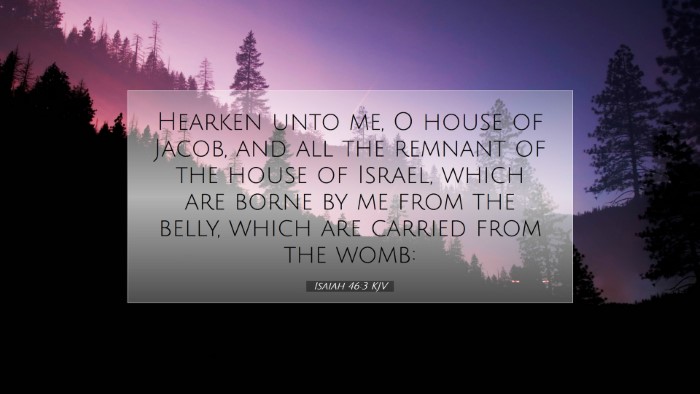Commentary on Isaiah 46:3
Bible Verse: "Hearken unto me, O house of Jacob, and all the remnant of the house of Israel, which are borne by me from the belly, which are carried from the womb." (Isaiah 46:3, KJV)
Introduction
Isaiah 46:3 presents a profound reminder of God’s enduring care for His people. This verse emphasizes the intimate relationship between God and Israel, portraying Him as a nurturing figure who has borne and carried His people since their inception. In examining this verse, we draw insights from the classic commentaries of Matthew Henry, Albert Barnes, and Adam Clarke to provide depth and understanding for pastors, scholars, and students of the Bible.
The Context of Isaiah
Isaiah prophesied during a tumultuous period for the people of Israel. The backdrop of idolatry, the threat of Assyrian invasion, and eventual Babylonian captivity loomed large. This context of despair and uncertainty makes the reassurance found in Isaiah 46:3 paramount. As we delve into the thoughts of various commentators, we uncover themes of God’s sovereignty, graciousness, and the nurturing aspect of His character.
Exegesis of Key Terms
-
“Hearken unto me”: The call to attention signals the urgency of God’s message through Isaiah. As Barnes notes, this plea underscores the necessity for the people to listen actively to God’s warnings and promises.
-
“O house of Jacob”: Referring collectively to Israel, this phrase encompasses both the covenant people and the remnant. Henry elucidates this point, emphasizing that God’s assurance was not limited to a select few but rather to His chosen nation as a whole.
-
“borne” and “carried”: The imagery of being borne from birth speaks of protection and sustenance. Clarke reflects on the depth of these words, suggesting that they illustrate God’s nurturing nature, akin to a mother caring for her child from the womb.
Theological Implications
This verse encapsulates key theological themes that are vital for understanding God’s relationship with His people. These include:
-
Divine Nurturing: Just as parents have a nurturing role, God’s declaration of having carried Israel from birth highlights His loving and caring attributes. Through this perspective, believers can draw comfort in His everlasting support and presence.
-
Covenant Faithfulness: The mention of the "house of Jacob" serves as a reminder of the covenantal relationship. Barnes emphasizes that this relationship assures the people of God’s unchanging nature even when they falter.
-
Call to Remember: The call to hearken is significant in its implication that the people must acknowledge and remember God’s acts of deliverance and provision throughout their history.
Pastoral Application
For pastors, this verse serves as a powerful reminder of their role in nurturing and guiding their congregations. The imagery of bearing and carrying can be applied to pastoral care, encouraging leaders to emulate God’s compassion and support in their ministries. It invites reflection on how pastors might extend God’s nurturing love to their congregations, particularly during times of distress or uncertainty.
Conclusion
In conclusion, Isaiah 46:3 encapsulates significant theological and pastoral truths that resonate deeply. Through the insights of Henry, Barnes, and Clarke, we glean a richer understanding of God’s nurturing, faithful, and parent-like care for His people. This verse calls for a response—a decision to listen and remember God’s faithfulness throughout history. It serves as a powerful reminder of the intimate relationship believers share with their Creator, encouraging a deeper reliance on His strength and support.


